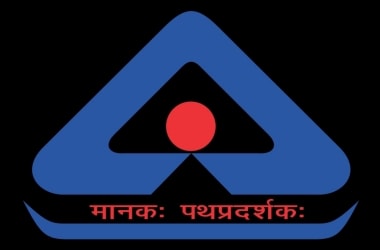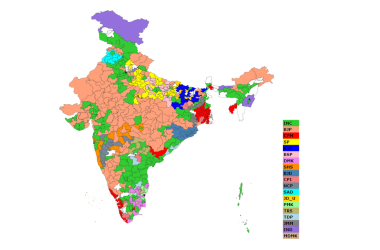Indian Polity - Current Affairs for October, 2017
Indian Polity Current Affairs for October, 2017
Month wise coverage of Indian Polity Current Affairs helps you improve your general knowledge and prepare for all competitive exams like IBPS, Bank PO, SBI PO, RRB, RBI, LIC, Specialist Officer, Clerk, SSC, UPSC, Railway etc. This section is updated daily with the most important events.Preparing Indian Polity Current Affairs October, 2017
1. Read the most important Indian Polity Current affairs and facts here. 2. Take practice test of our Indian Polity MCQ and Objective type questions. 3. Clear any quiz, GK, job interview or competitive exam on current affairs.
- Month & Year
▼ MHA set to take BCAS from MoCA [10-31-17]
 Ministry of Home Affairs (MHA) is set to move a proposal before the Cabinet Committee on Security (CCS) for taking over the Bureau of Civil Aviation Security (BCAS), currently under the Ministry of Civil Aviation (MoCA).
The move, initially opposed by MoCA, was proposed on the ground that security at airports is provided by the Central Industrial Security Force (CISF), which reports to the MHA.
BCAS is responsible for laying down standards, policies and measures with regard to security of all commercial flights.
Multiple agencies working at airports, including the Intelligence Bureau, immigration officials, security personnel, local police, are bound by regulations passed by BCAS.
The decision is based on a security audit conducted by a team of experts from the MHA, IB, CISF and BCAS, which had recommended the change.
Another reason cited for taking control of BCAS is the issue of security clearances for airlines and airports, granted by the MHA.
The move may result in an increase in passenger security fee since the CISF will be deployed at all the 98 airports across the country,.
Set up as a cell in the Directorate General of Civil Aviation (DGCA) in 1978, after an Indian Airlines flight was hijacked in September 1976, BCAS was reorganised as an independent department under the MoCA on April 1, 1987, as a follow-up to the Kanishka bombing in June 1985.
It is currently headed by a commissioner of security.
In 2012, the then UPA government moved a proposal to set up an exclusive Aviation Security Force (ASF), under the control of BCAS, to replace CISF at airports, following the International Civil Aviation Organisation’s recommendation.
However, the proposal was rejected by the NDA government, which decided to strengthen the CISF instead. Ministry of Home Affairs (MHA) is set to move a proposal before the Cabinet Committee on Security (CCS) for taking over the Bureau of Civil Aviation Security (BCAS), currently under the Ministry of Civil Aviation (MoCA).
The move, initially opposed by MoCA, was proposed on the ground that security at airports is provided by the Central Industrial Security Force (CISF), which reports to the MHA.
BCAS is responsible for laying down standards, policies and measures with regard to security of all commercial flights.
Multiple agencies working at airports, including the Intelligence Bureau, immigration officials, security personnel, local police, are bound by regulations passed by BCAS.
The decision is based on a security audit conducted by a team of experts from the MHA, IB, CISF and BCAS, which had recommended the change.
Another reason cited for taking control of BCAS is the issue of security clearances for airlines and airports, granted by the MHA.
The move may result in an increase in passenger security fee since the CISF will be deployed at all the 98 airports across the country,.
Set up as a cell in the Directorate General of Civil Aviation (DGCA) in 1978, after an Indian Airlines flight was hijacked in September 1976, BCAS was reorganised as an independent department under the MoCA on April 1, 1987, as a follow-up to the Kanishka bombing in June 1985.
It is currently headed by a commissioner of security.
In 2012, the then UPA government moved a proposal to set up an exclusive Aviation Security Force (ASF), under the control of BCAS, to replace CISF at airports, following the International Civil Aviation Organisation’s recommendation.
However, the proposal was rejected by the NDA government, which decided to strengthen the CISF instead.
|
▼ BIS Act 2016 comes into effect from Oct 12, 2017 [10-16-17]
 The much-awaited Bureau of Indian Standards (BIS) Act has come into effect from October 12 with a provision to bring more services and products like jewellery under the mandatory standard regime.
Parliament had, in March 2016, passed the law to replace the BIS Act of 1986.
The Consumer Affairs Ministry finalised the rules for the new law only this week.
The new law will further help ease of doing business in the country.
Not only the provisions of the Act will give fillip to ’Make In India’ campaign but also ensure availability of quality products and services to the consumers, he said.
As per the new law, the government can bring under compulsory certification regime any goods and service which it considers necessary in the public interest or for the protection of human, animal or plant health, safety of the environment, or prevention of unfair trade practices or national security.
Enabling provisions have also been made for making hallmarks of the precious metal articles mandatory.
The new Act also allows multiple type of simplified conformity assessment schemes, including self-declaration of conformity against a standard which will give simplified options (to manufacturers) to adhere to the standards and get certificate of conformity.
There is also a provision that enables the Centre to appoint any authority/agency, in addition to the BIS, to verify the conformity of products and services to a standard and issue certificate of conformity.
Further, there is provision for repair or recall, including product liability of the products bearing Standard Mark but not conforming to the relevant Indian Standard.
The current Bureau of Indian Standards (BIS) will be known as National Standards Body of India. The much-awaited Bureau of Indian Standards (BIS) Act has come into effect from October 12 with a provision to bring more services and products like jewellery under the mandatory standard regime.
Parliament had, in March 2016, passed the law to replace the BIS Act of 1986.
The Consumer Affairs Ministry finalised the rules for the new law only this week.
The new law will further help ease of doing business in the country.
Not only the provisions of the Act will give fillip to ’Make In India’ campaign but also ensure availability of quality products and services to the consumers, he said.
As per the new law, the government can bring under compulsory certification regime any goods and service which it considers necessary in the public interest or for the protection of human, animal or plant health, safety of the environment, or prevention of unfair trade practices or national security.
Enabling provisions have also been made for making hallmarks of the precious metal articles mandatory.
The new Act also allows multiple type of simplified conformity assessment schemes, including self-declaration of conformity against a standard which will give simplified options (to manufacturers) to adhere to the standards and get certificate of conformity.
There is also a provision that enables the Centre to appoint any authority/agency, in addition to the BIS, to verify the conformity of products and services to a standard and issue certificate of conformity.
Further, there is provision for repair or recall, including product liability of the products bearing Standard Mark but not conforming to the relevant Indian Standard.
The current Bureau of Indian Standards (BIS) will be known as National Standards Body of India.
|
▼ SC rules intercourse with minor wife is rape [10-12-17]
 In a landmark verdict, the Supreme Court (SC) on Oct 11, 2017 ruled that sex with a wife who is under 18 years of age is rape and therefore a crime.
The top court did not rule on 'marital rape', which is sexual intercourse forced upon a spouse no matter what their age.
Before today's SC ruling, there was an exception in Section 375 rape law provisions that protected a man who had sexual relations with his wife even if she was under 18, which is the age of consent.
Exception 2 in Section 375 of IPC (Indian Penal Code) granting protection to husband is violative of constitution and fundamental rights of minor bride.
The top court's verdict upholds the rights of 2.3 crore child brides in the country.
The SC rejected the plea of the Centre which justified the provision on the grounds that child marriage is a reality in the country and such marriage has to be protected.
A bench headed by Justice Madan B Lokur had on September 6 asked the Centre how Parliament could create an exception in a law when the age of consent is 18.
Also in September, the apex court had said it did not want to go into the aspect of marital rape, but when the age of consent was 18 years for "all purposes", why was such an exception made in the IPC.
SC Judgment: Know More In a landmark verdict, the Supreme Court (SC) on Oct 11, 2017 ruled that sex with a wife who is under 18 years of age is rape and therefore a crime.
The top court did not rule on 'marital rape', which is sexual intercourse forced upon a spouse no matter what their age.
Before today's SC ruling, there was an exception in Section 375 rape law provisions that protected a man who had sexual relations with his wife even if she was under 18, which is the age of consent.
Exception 2 in Section 375 of IPC (Indian Penal Code) granting protection to husband is violative of constitution and fundamental rights of minor bride.
The top court's verdict upholds the rights of 2.3 crore child brides in the country.
The SC rejected the plea of the Centre which justified the provision on the grounds that child marriage is a reality in the country and such marriage has to be protected.
A bench headed by Justice Madan B Lokur had on September 6 asked the Centre how Parliament could create an exception in a law when the age of consent is 18.
Also in September, the apex court had said it did not want to go into the aspect of marital rape, but when the age of consent was 18 years for "all purposes", why was such an exception made in the IPC.
SC Judgment: Know More
- Responding to the query, the Centre's counsel had said if this exception under the IPC goes, then it would open up the arena of marital rape which does not exist in India.
- Economic and educational development in the country is still uneven and child marriages are still taking place.
- It has been therefore decided to retain the age of 15 years under Exception 2 so as to give protection to husband and wife against criminalising the sexual activity between them.
- It is also estimated that there are 23 million child brides in the country.
- Hence, criminalising the consummation of a marriage with such a serious offence such as rape would not be appropriate and practical.
|
▼ Voter Verifiable Paper Audit Trail (VVPAT) [10-3-17]
 The Election Commission of India (EC) will use Voter Verifiable Paper Audit Trail (VVPAT) gadgets with Electronic Voting Machines (EVM) in all 50,128 voting booths in Gujarat, which goes to the Assembly polls at the end of this year.
This is the first time an entire assembly poll will be conducted using the EVMs equipped with VVPAT.
VVPAT machines, which will be attached to the EVMs, will allow voters to verify if their vote has gone to the intended candidate.
This would ensure transparency in the voting process.
The machine is being put to use in Gujarat following a petition filed by Ms. Reshma Patel, one of the conveners of the Patidar Anamat Andolan Samiti. The Election Commission of India (EC) will use Voter Verifiable Paper Audit Trail (VVPAT) gadgets with Electronic Voting Machines (EVM) in all 50,128 voting booths in Gujarat, which goes to the Assembly polls at the end of this year.
This is the first time an entire assembly poll will be conducted using the EVMs equipped with VVPAT.
VVPAT machines, which will be attached to the EVMs, will allow voters to verify if their vote has gone to the intended candidate.
This would ensure transparency in the voting process.
The machine is being put to use in Gujarat following a petition filed by Ms. Reshma Patel, one of the conveners of the Patidar Anamat Andolan Samiti.
|